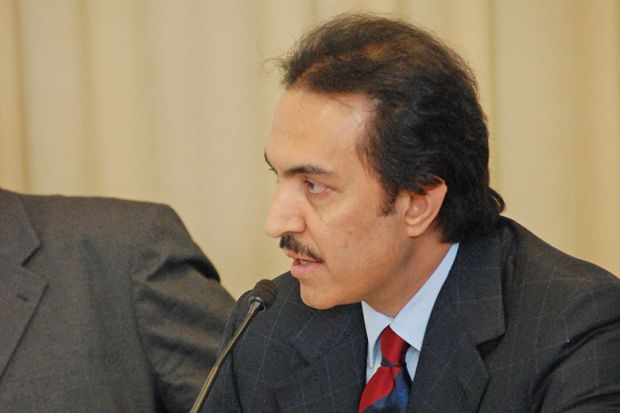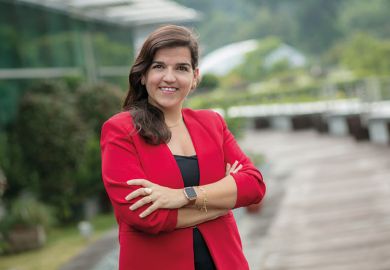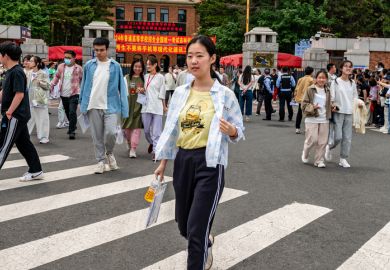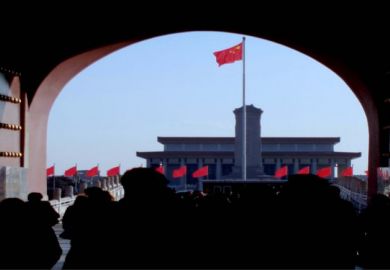Nayef Al-Rodhan is an honorary fellow of St Antony’s College, Oxford, and director of the Geopolitics and Global Futures Programme at the Geneva Centre for Security Policy. He began his career as a neurosurgeon at the Mayo Clinic in Minnesota and Harvard Medical School, before shifting his focus to the interplay between neuroscience and international relations. In 2013, he founded the Nayef Al-Rodhan Prize for Global Cultural Understanding, which offers a £25,000 award annually to the author of the best non-fiction book on the subject. Submissions for this year’s award are open until 28 February.
Where and when were you born?
Saudi Arabia, 1959.
How has this shaped who you are?
I grew up in an old and distinguished Saudi Arabian family that values scholarship, diversity, excellence and integrity, while respecting everybody and everything. My family insisted that there is room for everyone and that everyone has to do well, if humanity as a whole is to triumph.
How did you come about sponsoring the Al-Rodhan prize, and why is it important to you?
Culture is a highly emotional enterprise and must not be dismissed lightly in global affairs. This is because it is tied to self-worth, historical narratives and what I call “ancestral loyalties”. Given the meeting of minds between the British Academy and myself, it appeared that there was room for advocating such a prize to encourage scholarly and policy effort in aiding public understanding of global cultural issues. Over the years, the international political climate has become such that the values that underpin the prize – and the celebration of voices that are intelligent, considered and tolerant – are more critical than ever.
What are the biggest misconceptions about your fields of study?
Neuroscience is thought to be about brain scans, cells and strokes, whereas our insights into the neurochemical foundations of behaviour are critical to politics and societies in general. Likewise, not many people understand what neurophilosophy is about…in fact, it marries two critical disciplines that are important for all kinds of scholarly insights about human nature and what that means for domestic and global affairs.
What has changed most in global higher education in the past 10 years?
An increased realisation of the critical value of multidisciplinary approaches to problem-solving and scholarly innovation, although we still have a way to go.
Who have you met who has had a profound effect on you and your work?
There have been many people but a few come to mind: the late Lord Walton of Detchant, who inspired me to go into the neurosciences; my eminent neurosurgical mentor, Thoralf M. Sundt Jr, in the US. Those who I have not met but who have inspired me greatly include Bertrand Russell, Averroes (Ibn Rushd), John Locke, Immanuel Kant and John Rawls.
What kind of undergraduate were you?
Quite disciplined, but often scattered because I had too many intellectual interests.
What advice would you give your younger self?
Never let small distractions get in the way of your daily serenity; most people are more emotional than rational; and that a mixture of excellence, integrity, patience and wisdom will always triumph at the end of the day.
If you were universities minister for a day, what policy would you introduce?
I would make education more multidisciplinary, boost funding not just for basic research but also for applied research, [and] increase the number of overseas exchange programmes to expose students to other cultures, ways of thinking and disciplines. This will encourage transcultural synergies [and] minimise preconceptions, stereotypes and barriers that are an impediment to sustainable global exchanges, peace and prosperity.
What advice would you give to students?
Have the courage to seek unusual fields of knowledge, to change course, and to excel with integrity and goodwill. Go with what moves you with passion, not what is trendy or what guarantees a good job. And always aim to make a positive impact far beyond your own personal needs and ambitions.
What would improve your working week?
Having more time to reflect; and to engage more with a wide range of unrelated disciplines and methodologies.
If you weren’t an academic, what do you think you’d be doing?
I would be an architect. I am a big fan of elegant structures that convey beauty and functionality and borrow from different cultural architectural traditions, especially combining Arab/Islamic, Roman/Greek, and Chinese.
What keeps you awake at night?
Nothing. I am disciplined enough to know that mornings are never far off, and that all will be well [providing you have] a little bit of optimism, confidence, courage, a lot of fairness, common sense and goodwill.
What do you do for fun?
Exotic travel and cultural trips with friends and family. Also, a quiet afternoon of inspired reflection.
What’s your biggest regret?
I don’t have one. While I normally do acknowledge and appreciate decency, friendship and a strong moral fibre in people, maybe I should have verbalised that to [people] more often.
What brings you comfort?
Health, happiness and success for my friends and loved ones; and, globally, peace, prosperity, dignity and respect for all.
What saddens you?
The human misery, deprivation, disrespect, humiliation, hopelessness, insecurity and alienation of those less fortunate all over the globe.
Do you live by any motto or philosophy?
Courage, excellence, integrity, empathy and goodwill.
What would you like to be remembered for?
Advocating the central and critical nature of dignity, in its holistic sense, for the sustainability of human civilisation. Second, for advocating a neurophilosophical theory of human nature that suggests that we are amoral creatures at best, more emotional than rational, and that our moral compass is malleable and governed primarily by our perceived emotional self-interest. This framework is critical for developing sustainable, inclusive, innovative, peaceful and prosperous governance structures both domestically and internationally.
rachael.pells@timeshighereducation.com
Appointments
Mark Cassidy has been appointed dean of the Melbourne School of Engineering. Professor Cassidy, currently a professor of civil engineering and director of the Centre for Offshore Foundation Systems at the University of Western Australia, will take up the post in July. Carolyn Evans, acting vice-chancellor of the University of Melbourne, said that Professor Cassidy would bring knowledge and expertise to the faculty as it prepares to move to a new campus. “We are confident that he will bring the vision, drive and commitment to excellence to lead during this exciting time,” she said.
Jenny Baxter, a former divisional chief operating officer and major programme director for the BBC, has been appointed chief operating officer at the University of East Anglia. Ms Baxter will oversee professional services at the institution and will be tasked with helping to deliver its 2030 Plan. David Richardson, UEA’s vice-chancellor, said that Ms Baxter’s “impressive track record of managing major change programmes and experience of digital transformation is a real strength as we look to build on UEA’s recent successes”.
Bill Anderson has been named group chief executive of the £413 million Cambridge Assessment, the examinations arm of the University of Cambridge. Mr Anderson – who will start at Cambridge Assessment on 5 March – joins from the education company Pearson. His last role was senior vice-president (product), where he led the product and product technology teams.
Scott Ford has been named associate vice-president of new business development at the University of Notre Dame. He has held a number of senior roles in the public and private sectors in South Bend, Indiana.
James Baker has been named chief executive of Graphene@Manchester, which leads business-facing development of graphene and 2D materials at the University of Manchester. He was previously graphene business director at the university’s National Graphene Institute.
Register to continue
Why register?
- Registration is free and only takes a moment
- Once registered, you can read 3 articles a month
- Sign up for our newsletter
Subscribe
Or subscribe for unlimited access to:
- Unlimited access to news, views, insights & reviews
- Digital editions
- Digital access to THE’s university and college rankings analysis
Already registered or a current subscriber?








